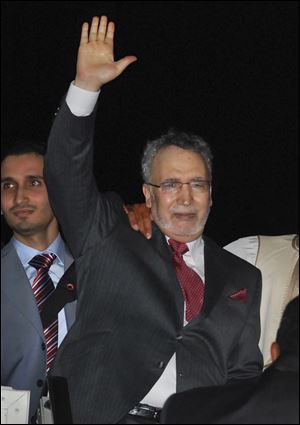
Lockerbie bomber who killed 270 dies of cancer
5/21/2012
Libyan Abdel Basset al-Megrahi died at his home on Sunday. He was 60.
TRIPOLI, Libya — Abdel Basset al-Megrahi, a Libyan intelligence officer who was the only person ever convicted in the 1988 bombing of Pan Am Flight 103 over Lockerbie, Scotland, that killed 270 people, died Sunday of cancer. He was 60.
Megrahi was serving a life sentence in a Scottish prison in 2008 when he was diagnosed with prostate cancer. In August, 2009, he was released under a Scottish law that allows terminally ill prisoners to die at home.
When he was freed, Megrahi was expected to live three months.
That Megrahi died in his native country — and not in a Scottish prison cell — was a shocking end to the life of a man considered a terrorist by the U.S. government and whom the FBI once placed on its “most wanted” list.
During the late 1980s, Megrahi technically was serving as chief of security for the state-owned Libyan Arab Airlines. In reality, however, the job was his cover as a clandestine officer in Libya’s intelligence agency.
His work with the airline took him around the world, including to Switzerland and the island nation of Malta. It also helped him gain intimate knowledge of airport security — and its weaknesses.
On Dec. 21, 1988, a bronze hard-shell Samsonite suitcase was loaded onto an Air Malta plane bound for Frankfurt. From Germany, the suitcase was transferred onto a flight to London. Upon arrival, the bag was placed inside the forward cargo bay of a Boeing 747 jumbo jet.
Bound for New York, Pan Am Flight 103 held 189 Americans, including a group of Syracuse University college students returning home for the holidays from a semester abroad.
The jet was cruising at 31,000 feet when a bomb exploded.
All 259 aboard the plane died and 11 people on the ground were killed when flaming chunks of the plane plummeted into the village of Lockerbie.
The act of terrorism led to a manhunt in which an international team of investigators pursued leads in 50 countries and interviewed 14,000 people.
Authorities traced Megrahi to the crime after combing through an 845-square-mile area of Scotland in a search for clues in the wreckage.
Investigators discovered a plastic fragment the size of a fingernail and the singed remains of a shirt amid the debris.
The shard of green plastic proved to be the circuitry of a Swiss-made timing device used to detonate the explosive. U.S. intelligence analysts later found that the Libyan government had purchased an identical set of timers earlier in the 1980s.
The shirt, which authorities found had been packed inside the same suitcase as the bomb, was sold at a Maltese fashion boutique called Mary’s House.
The shop owner later identified Megrahi as the person who bought the shirt.
The complexity of the operation, which required expert knowledge of airport security to smuggle on a piece of luggage unnoticed, and the fact that the bomb’s timer was linked to Libyan intelligence led to Megrahi’s indictment in 1991.
A $4 million bounty was placed on his head.
Charges were filed simultaneously against Megrahi and a Libyan co-conspirator, Lamen Khalifa Fhimah, in the United States and Scotland.
Libyan leader Moammar Gaddafi refused to extradite the men, but placed them both under house arrest.
After lengthy negotiations, Gaddafi agreed in 1999 to surrender the men to a trial in the Netherlands with Scottish judges.
In 2001, Megrahi was convicted of mass murder and sentenced to life in prison, with a minimum term of 27 years. Fhimah was acquitted.
Gaddafi’s government never denied involvement in the bombing and over several years paid $2.7 billion to the families of victims.
After his cancer diagnosis, Megrahi requested that he be sent home.
When he arrived in Tripoli in 2009, he was greeted by hundreds of jubilant Libyans.
The decision to allow his release enraged many of the families of Lockerbie bombing victims.
Until his death, Megrahi maintained his innocence, claiming that he was the victim of an international conspiracy.
“You judge me falsely,” Megrahi once told an American interviewer. “My life is clean.”